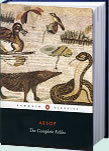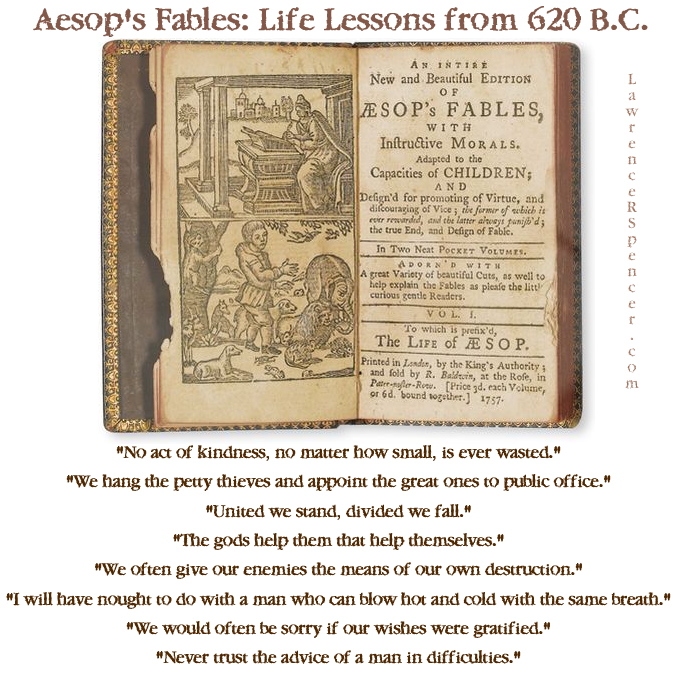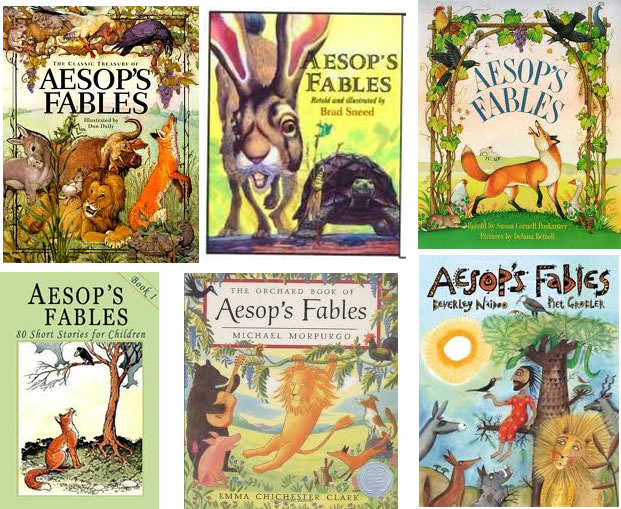Republished by Blog Post Promoter
AESOP’S FABLES are a collection of hundreds of short stories, usually featuring animals impersonating humans, that tell a pithy moral story. They are precise observations of human behavior made more than 2,500 years ago by a Greek writer / philosopher. Aesops lived in Greece around the same time the Buddha and Loa-Tze lived in the India and China. His moral lessons are as relevant now as they were in 620 BCE. This demonstrates the maxim that “The more things change, the more they stay the same“. Apparently, this applies even more so to human behavior and misbehavior. — Lawrence Spencer, 2012
________________________________________________________________________
Aesop (c. 620-564 BC) was a fabulist or story teller credited with a number of fables now collectively known as Aesop’s Fables. He was born a slave, and in his lifetime two different masters owned him before being granted his freedom. The slave masters were named, Xanthus and Iadmon, the latter gave him his freedom as a reward for his wit and intelligence. As a freedman he became involved in public affairs and traveled a lot—telling his fables along the way. King Croesus of Lydia was so impressed with Aesop that he offered him residency and a job at his court.
 “The popularity of Aesop is also shown by the fact that Plato records that Socrates decided to versify some of his fables while he was in jail awaiting execution.” -Robert Temple
“The popularity of Aesop is also shown by the fact that Plato records that Socrates decided to versify some of his fables while he was in jail awaiting execution.” -Robert Temple
While on a mission for King Croesus to distribute a certain amount of gold to the people of Delphi in Greece, there was a misunderstanding about how much gold each person was supposed to receive. Aesop became discouraged because the Delphians did not seem appreciative enough of the gift from the King so Aesop decided to take it all back to King Croesus. On his journey back the people of Delhi, who thought he was actively cheating them and giving them a bad reputation, tracked him down. Lloyd W. Daly writes “Apprehensive of his spreading this low opinion of them on his travels, the Delphians lay a trap for Aesop. By stealth they [stashed] a golden bowl from [their] temple in his baggage; then as he starts off through Phocis, they overtake him, search his baggage, and find the bowl. Haled back to Delhi, Aesop is found guilty of sacrilege against Apollo for the theft of the bowl and is condemned to death by being hurled off a cliff.”
READ THE ON-LINE FABLES OF AESOP HERE: http://www.aesopfables.com/aesopsel.html
“We hang the petty thieves and appoint the great ones to public office.”
“United we stand, divided we fall.”
“The gods help them that help themselves.”
“The shaft of the arrow had been feathered with one of the eagle’s own plumes. We often give our enemies the means of our own destruction.”
“I will have nought to do with a man who can blow hot and cold with the same breath.”
“We would often be sorry if our wishes were gratified.”
“Never trust the advice of a man in difficulties.”
“No act of kindness, no matter how small, is ever wasted.”


